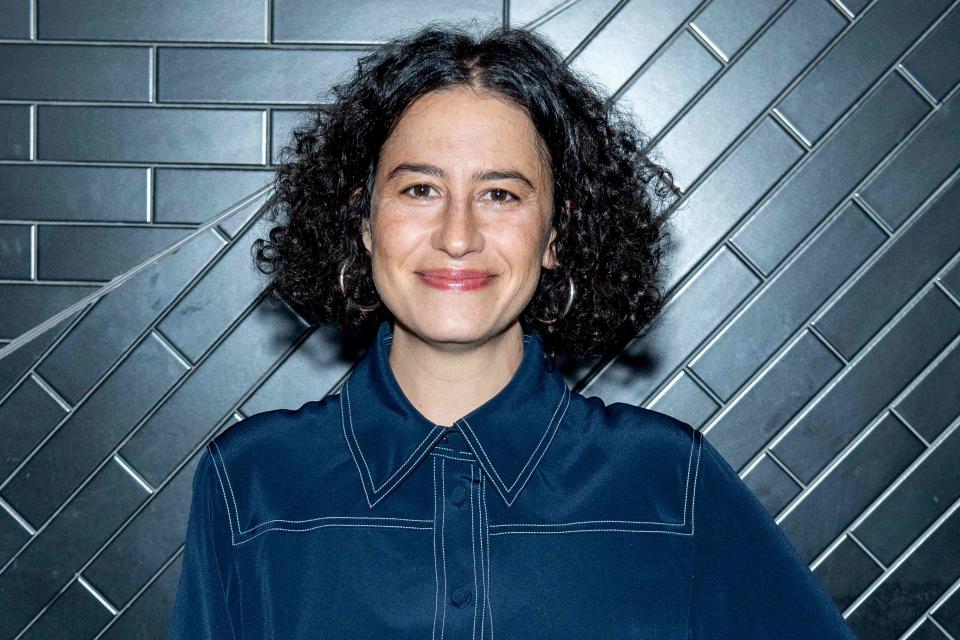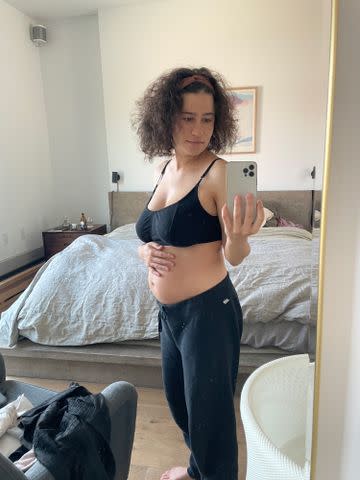Ilana Glazer Wants to Talk About the "P" Word — AKA Your Pelvic Floor
- Oops!Something went wrong.Please try again later.
- Oops!Something went wrong.Please try again later.
The comedian, mother, and newly minted advisor talks about her latest venture, Origin.

“Let’s talk about HER,” Ilana Glazer quips over Zoom. The "her" we're talking about is bold, assertive, but often ignored — and will definitely make her presence known if neglected for too long. We’re talking, of course, about your pelvic floor, an often misunderstood body part that consists of your vaginal muscles, core, and diaphragm.
“If you lift your groceries and your kids using your pelvic floor, you’re making your whole body stronger. If you focus on strengthening your pelvic floor during sex, you’ll have stronger orgasms,” Glazer explains. “Improving your pelvic floor means improving your overall health!”
Related:Taraji P. Henson Wants to Humanize Black Women
If you’re familiar with Glazer’s work, you know she has no problem talking about it all — sex, politics, misogyny, even a little pussy ‘ppreciation. But there's one thing her Broad City viewers and standup fans never got to see: Glazer’s decades-long struggle with pelvic floor dysfunction. Her issues didn’t just make themselves known during sex or in the bathroom. They left her fainting from pain, pushed her out of social settings, and contributed to her anxiety.
“I used to pass out. I was 19 and so afraid of being out when the pain would start and having to manage that pain," she explains. "I would leave parties early!” Even worse? Doctors would misattribute her pain to sex or simply suggest that she use lube.

Ilana Glazer
Since finally getting a diagnosis and starting treatment at 24 years old, Glazer has tried to find ways to break the silence around pelvic health. She recalls a scene in Season 3 of “Broad City” where Abbi Abrams is peeing, and Ilana Wexler exclaims, “Pelvic floor strength, Gaga.” A show that broke many barriers for women, Broad City honestly depicted the struggles and growing pains of two twenty-somethings in New York City, and weaving her own health experience into the plot helped Glazer surface the topic. But she didn't always feel empowered to speak up.
“I’m a comedian, I’m a performer, I’m 35, and I continue to heal from the shame,” Glazer reveals. “It’s connected to everything we do, so to understand it frees us from it.” Armed with the information and tools to treat her chronic pain, the comedian and activist now strives to help other people find the same freedom with her latest project, Origin.
Related:Sophia Bush Thinks We Should Call Out Brands That Don't Step Up for Reproductive Rights
Through this new venture, Glazer — alongside founder Nona Farahnik Yadegar — hope to share information, democratize resources, and offer solutions to those dealing with pelvic floor issues across the country. At its core, Origin is a telehealth service that provides virtual healthcare via pelvic floor physical therapy. “Pelvic floor health is essential for everything from sex to childbirth to menopause,” Yadegar shares with InStyle. “We really envision Origin as a destination where every woman can learn about themselves, manage pain, grow stronger, and feel better through every stage of life.”
As much as improving pelvic floor health is about physical healing, the inner work — namely, improving everyone's relationship with their own bodies — is just as healing. “I endured so much pain as a person from age 4-24, and then I healed my pain, and the next step was empowerment. I can now engage and rest my pelvic floor with more control than ever before [thanks in part to Origin’s physical therapy]. Sex became more intensely pleasurable and less painful. This is the most empowered I’ve felt in my pelvic floor.”
Related:Priyanka Chopra Jonas Revealed That She Froze Her Eggs in Her 30s to Give Herself "Freedom"
Glazer is tackling an issue that many people deal with, but few speak about. That's what makes Origin's taboo-breaking mission so powerful: It acknowledges that women deserve to feel good in (and about) their bodies. “When I am with a group of women, I always ask who pees when they sneeze or who has experienced painful sex. 8/10 women will raise their hands,” Yadegar tells us. “I can’t wait until I am with a group of women and 8/10 of them have experienced pelvic floor PT and feel like they have the tools and resources to address these issues when (or even before!) they take place.”
Unfortunately, getting access to pelvic floor physical therapy has historically been difficult. There is one pelvic floor PT for every 4,000 people who need help each year, and 80% of those PTs are typically out of network. Many patients also live in pelvic floor PT “deserts,” which means they are left with little to no options to see a provider near their homes. With Origin now available in as many as 35 states this week, many people across the United States will finally be able to have their questions answered and their pain relieved.
For Glazer, becoming a mother felt like the next evolution or “sequel” of this long journey strengthening her pelvic floor after 20 years of chronic pain. “[The physical therapy] was important to me because I wanted to feel as strong as possible during my pregnancy and birth.” With guidance from Origin’s physical therapy sessions and Loom’s educational resources, Glazer found her pregnancy to be “extremely healing,” sending gratitude to her belly and pelvic floor for what they are able to do.
In the same way working on your pelvic floor leads to better health, dismantling the shame around the pain allows for open, honest, and healing conversations to happen. While Glazer acknowledges the despair marginalized groups continue to face today, her lived experience as a woman who has suffered from chronic pain has allowed her to find her voice in advocating for more for other people with the same issues.
For more InStyle news, make sure to sign up for our newsletter!
Read the original article on InStyle.

